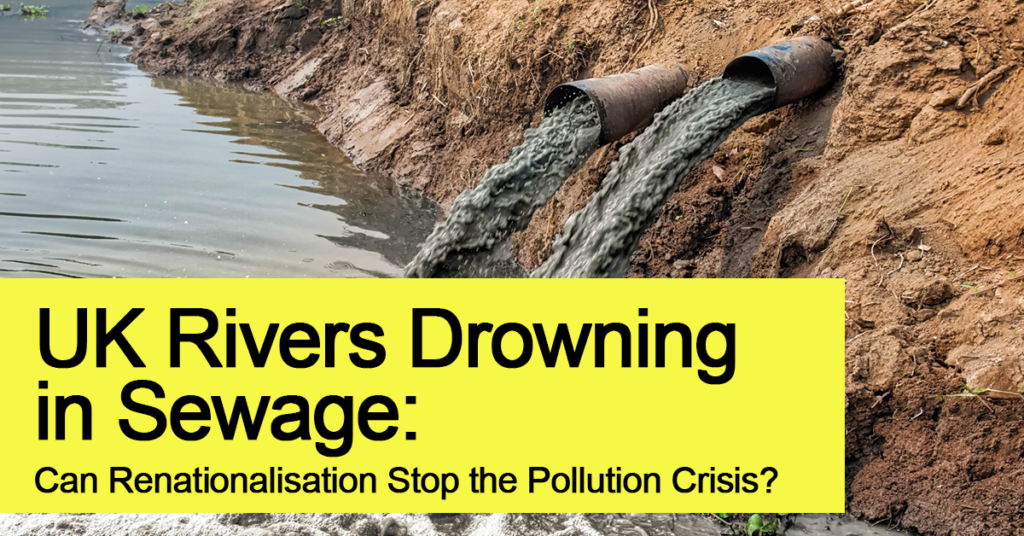
In a move that has rightfully sparked outrage, the UK’s Environment Agency awarded United Utilities and Severn Trent Water a four-star environmental rating, despite the companies’ involvement in illegally dumping untreated sewage into rivers and seas on an astonishing 1,374 occasions. This decision has amplified public concern over how environmental standards are being measured and enforced, especially as anger over sewage pollution continues to grow. But more than just regulatory failures, this debacle highlights the inherent problems of privatized utilities prioritising profits over public and environmental health. It’s time to rethink the privatisation model and pursue nationalisation as the only solution to restore accountability and protect our natural resources.
The Reality Behind the Numbers: Profit-Driven Pollution
The Environment Agency’s own data paints a grim picture of the water companies’ practices. In 2022 alone, over 301,000 sewage spills were recorded, polluting the UK’s rivers, lakes, and seas. This is not simply an unfortunate byproduct of outdated infrastructure or heavy rainfall—it is the direct result of decades of underinvestment by private water companies that have failed to reinvest in critical improvements. Instead, they have focused on maximising shareholder profits, leaving the public to bear the cost of the environmental damage.
United Utilities, serving over 7 million people in the North West, and Severn Trent, serving 8 million in the Midlands, are two of the worst offenders. Their reliance on storm overflows—mechanisms that release untreated sewage into rivers during heavy rainfall—has been grossly abused. What should be a rare, emergency measure has become routine. Private water companies argue that they are investing in their systems, but the evidence suggests that profits have taken precedence over public safety and environmental stewardship.
Greenwashing or Genuine Improvement? The Sham of Environmental Ratings
The Environment Agency’s decision to award four-star ratings to these companies smacks of greenwashing. While Severn Trent and United Utilities may claim improvements in certain areas, like reducing major pollution incidents or carbon footprints, the staggering number of sewage spills they continue to commit makes any positive evaluation deeply questionable.
These ratings are based on a handful of criteria, including investment in infrastructure and pollution response times, but fail to capture the full extent of the companies’ negligence. With United Utilities responsible for 68,725 spills in 2022 and Severn Trent reporting 44,765, it’s clear that any superficial progress is far outweighed by ongoing environmental destruction. This is yet another example of how the regulatory framework favors corporate interests over public and ecological welfare.
Nationalisation: The Only Sustainable Solution
The failure of private water companies to prioritise public health and environmental protection demonstrates the limits of privatisation. Since water services were privatized in the 1980s, these companies have consistently shown that their primary concern is profits, not people. Dividends to shareholders often exceed billions of pounds annually, while investments in infrastructure lag behind. This cannot continue. The solution is simple: nationalise the water companies.
By bringing water utilities back into public ownership, we can ensure that the primary focus is on providing safe, clean water and protecting the environment—not generating profit. Nationalisation would allow for proper investment in infrastructure, stronger environmental oversight, and greater accountability to the public. It would put an end to the current practice of water companies prioritising shareholder returns over vital upgrades to wastewater systems. The catastrophic pollution of UK rivers and seas cannot be solved by piecemeal reforms; we need structural change that only national ownership can provide.
Environmental Devastation: From Ecosystems to Human Health
The unchecked dumping of untreated sewage has had devastating effects on the environment. UK rivers, home to diverse species of fish, birds, and plants, are suffering unprecedented levels of pollution. The harmful chemicals and pathogens in sewage poison aquatic ecosystems, leading to a sharp decline in wildlife populations and biodiversity. This is not just an ecological crisis; it is a human health issue. As more people engage in water-based recreational activities, they are exposed to dangerous bacteria like E. coli, increasing the risk of illness.
Despite these grave consequences, private water companies continue to shirk their responsibility. Their failure to invest adequately in infrastructure means the risk of pollution incidents will only increase, particularly as climate change leads to more extreme weather events. Nationalisation would empower the public sector to address these challenges head-on, with long-term planning and investment in infrastructure that safeguards both the environment and public health.
Regulatory Failure: A System Stacked in Favor of Corporations
The Environment Agency’s decision to grant top environmental ratings to polluting water companies is emblematic of a regulatory system that is broken. Critics have long accused the government of being too lenient with these companies, allowing them to continue business as usual despite their flagrant disregard for environmental laws. The public is increasingly aware of these regulatory failures, with anger mounting over the lack of meaningful consequences for companies that pollute.
Water should be a public good, not a commodity for private profiteers. Regulatory reforms will not be enough to fix the systemic issues within the water industry. The only way to ensure that water services are managed in the public interest is through nationalisation. By removing the profit motive, we can establish a water system that is transparent, accountable, and truly dedicated to the public good.
A Call for Immediate Action
The UK government must act now to end this destructive cycle. Nationalising the water companies would enable the creation of an independent, publicly accountable body to oversee water services and ensure that decisions are made based on public health, environmental protection, and long-term sustainability—not short-term financial gain. Stronger regulations and penalties are also essential to prevent future pollution incidents and restore public trust.
The time for half-measures is over. Public outrage over sewage spills will only continue to grow, and the government must respond by prioritizing the public and the environment over corporate profits. Nationalisation offers a pathway to cleaner water, healthier ecosystems, and a fairer society.
Conclusion: Putting People Over Profit
The awarding of top environmental ratings to companies responsible for thousands of illegal sewage spills is a glaring example of the deep-rooted problems in the UK’s water industry. The private model has failed, and it is time for the government to take decisive action by bringing water services back into public ownership. Only through nationalisation can we achieve the accountability, investment, and environmental protection needed to safeguard our waterways and ensure access to clean, safe water for all. The future of the UK’s water system depends on putting people and the planet before profit.
Citations:
- Environment Agency, “Water and sewerage company performance”, Environment Agency, 2022.
- “Sewage spills: UK water companies released untreated sewage 301,000 times last year”, The Guardian, 2023.
- “Severn Trent and United Utilities fined for illegal sewage discharges”, BBC News, 2023.














